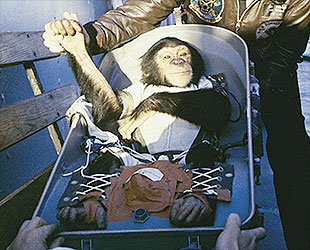July 18, 2008 — "How did you come up with the name of 'Ham' for a monkey?" asked a young girl of Rob Moreland after watching "Space Chimps", the animated movie that he and director Kirk De Micco co-wrote, and which opens in theaters on Friday (July 18).
"That's a great question," replied Moreland at the preview screening held Thursday in Houston for NASA employees and their families. "The first primate ever to go into outer space was named Ham. It's a real chimp. That was Ham, the first."
Not that the Ham in Moreland's screenplay is one and the same.
"I read a lot about Ham's mission," Moreland explained to collectSPACE. "I found some wonderful resources online, but we weren't trying to make a movie about Ham I, we were always trying to make a movie about this imaginary character, Ham III."
In the computer-animated "Space Chimps", the first Ham is shown in a flashback sequence making his 1961 flight aboard Mercury-Redstone 2, demonstrating the ability to perform tasks in microgravity. To his grandson, a circus performer, his since departed namesake served as little more than a guinea pig to clear the way for humans to fly. To Ham III, quips Moreland, "The only space for me, is MySpace."
That is, until a mission to track a lost billion-dollar space probe is deemed too dangerous for humans and a publicity seeking-senator sees the potential of drafting the only descendent of the hero chimp, even if its against his will. Hijinks follow as this kid-friendly film follows Ham III and his simian crew mates on their own space adventure.
"We used a lot of history in the inspiration of it but we did not really use it to form the story, except for the idea that his grandfather was a noble character," said Moreland. "If we were telling a realistic story about Ham, I am sure it would be very different."

The real "space chimp" Ham after his sub-orbital spaceflight on the Mercury-Redstone rocket. (NASA) |
In reality, the original Ham was selected from 40 chimps brought to New Mexico by the Air Force in 1959. Trained to push a lever in response to a signal light, the two-year old Ham's 17 minute sub-orbital mission on Jan. 31, 1961 set the stage for Alan Shepard to fly later that year. Only one more chimpanzee, Enos, flew in space and his orbital flight similarly paved the way for astronaut John Glenn.
Following his flight, Ham was retired to the National Zoo in Washington, D.C., followed by the North Carolina Zoo. He died at age 26 in 1983, never fathering any offspring.
And unlike the space agency shown in "Space Chimps", the real NASA nor the Air Force further trains primates for flights into space.
Realism aside, "Space Chimps" celebrates the legacy of Ham and the original astro-chimps through the themes it conveys and the multitude of references to space history and to space-themed movies. Ham's mentor in the movie, for example, is named Houston setting up the "Apollo 13" borrowed quote, "Houston, we have a problem".
"Really, that's there to appeal to the adults, as you really don't expect the kids to key into Buck Rogers," Moreland said of another quote from the film "The Right Stuff".
But for those too young to know the history, like the girl who wondered where Ham got his name, "Space Chimps" offers a humorous introduction.
And as for that name, Ham was originally Chang but as to avoid any chance of offending the Chinese, he was given a moniker based on the acronym for Holloman Aerospace Medical Center, and as such Ham the chimp made space history.
Space Chimps is a Twentieth Century Fox release of a Vanguard Animation film directed by Kirk Di Micco from his script with Robert Moreland. Opens today at theaters.
